Published May 13, 2024
By Luisa Gomez Betancur, Senior Attorney, and Lani Furbank, Communications Campaign Specialist.
The Escazú Agreement is the first legally binding regional treaty that upholds environmental democracy — the right to information, participation, and justice — in Latin America and the Caribbean, and the first in the world containing specific provisions aiming to guarantee a safe and enabling space for environmental defenders. This agreement is a vital tool to protect those who risk their lives to defend human rights and the environment, precisely because the region is the most dangerous in the world for frontline defenders. Last month, States, Ethnic and Indigenous Peoples, and civil society gathered in Santiago, Chile, for the third meeting of the Conference of the Parties (COP3) to the Escazú agreement to discuss the treaty’s implementation.
The right of every person to participate in decisions that may affect their lives and the environment is at the core of environmental democracy. To engage meaningfully and safely citizens must be able to access information and voice opinions and concerns openly without fear of reprisals, harassment, or criminalization. Finally, communities have the right to access justice to challenge and appeal any of these environmental decisions when their rights have been infringed.
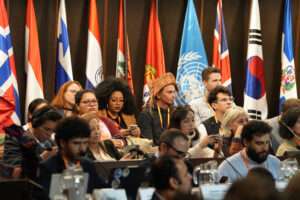
Notably, the Escazú Agreement stands out as the only international treaty that explicitly recognizes the “public” as a stakeholder entitled to meaningful participation in the work to construct, implement, and enforce the agreement. This means the biannual Escazú COP offers civil society, Ethnic and Indigenous Peoples, and community members a unique platform where their involvement can lead to substantial influence and tangible outcomes.
CIEL joined dozens of regional and international partners at Escazú COP3 to advocate for a robust Action Plan on human rights defenders and draw critical connections between the scope of the Escazú Agreement and the ongoing Advisory Opinion (AO) process at the Inter-American Court of Human Rights on the climate emergency and human rights.
Here are the key outcomes from Escazú COP3:
Strengthening the Action Plan on Defenders
At Escazú COP3, a key item on the agenda involved discussing and adopting the draft Action Plan on
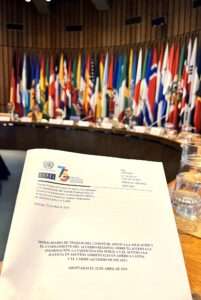
human rights defenders in Latin America and the Caribbean. This plan outlined priority areas and strategic steps to fulfill Article 9 of the Escazú agreement, which requires States to ensure a secure and supportive atmosphere for individuals, groups, and organizations that advocate and protect human rights in environmental issues.
The plan, resulting from a two-year public consultation process — which CIEL took part in along with regional and international partners — was adopted at Escazú COP3, marking a significant milestone in protecting human rights defenders in Latin America and the Caribbean. While there is still room for improvement to broaden public participation and more fully integrate demands by Ethnic and Indigenous Peoples, this plan will serve as a regional roadmap to strengthen four priority areas:
- knowledge creation;
- recognition;
- capacity building and cooperation for national implementation of the action plan; and
- evaluation, follow-up, and review of the action plan.
Our advocacy now will focus on identifying a clear timeframe to ensure ambitious national implementation plans are developed and carried out effectively.
Bringing Escazú to the Inter-American Court of Human Rights
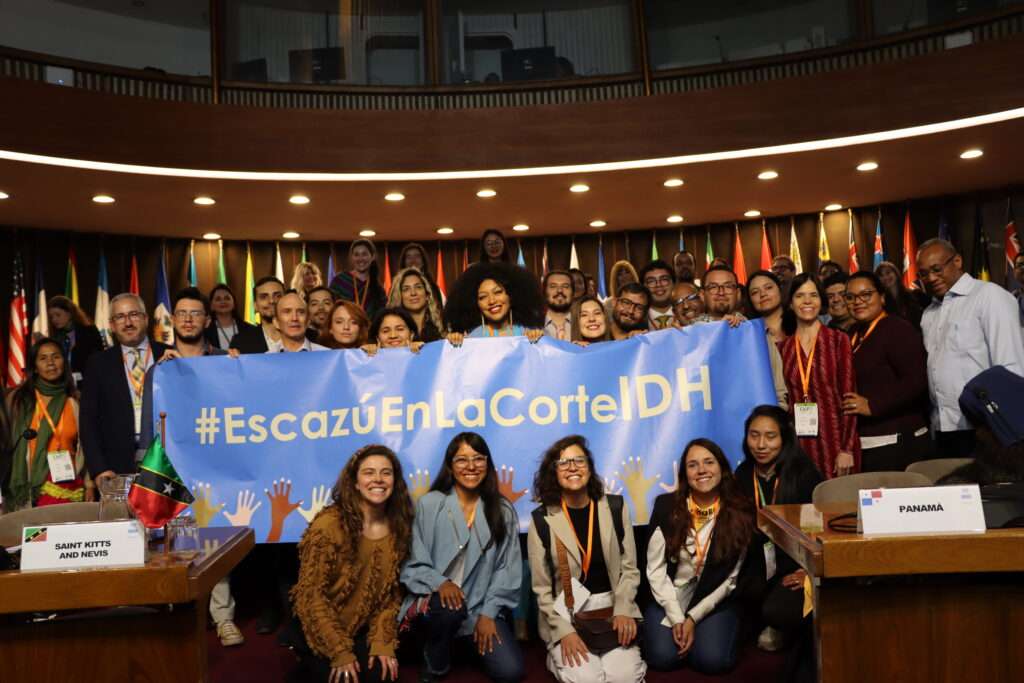
During Escazú COP3, as discussions unfolded in Santiago, the Inter-American Court of Human Rights held hearings in Bridgetown, Barbados, as part of its advisory opinion process on the climate emergency and human rights. These events and the forthcoming AO represent a historic opportunity for the Court to adopt the standards of the Escazú Agreement as Inter-American norms.
To reinforce this connection, CIEL and partners hosted a side event at Escazú COP3 focused on defenders in the climate emergency and how the Court should ensure the protection of human rights for a group that faces disproportionate risks.
The panelists discussed arguments and cases highlighted in the various written submissions to the Court by the Secretariat of the Aarhus Convention and the Special Rapporteur on Environmental Defenders under the Aarhus Convention; Robert F. Kennedy Human Rights along with six additional organizations; and fifteen Civil Society Organizations (CSOs), Ethnic and Indigenous Peoples, and Escazú stakeholders. Panelists were joined by Court staff involved in the AO proceedings, which allowed for timely insights into the process and its relevance to environmental defenders.
Fostering Civil Society Collaboration in the Region
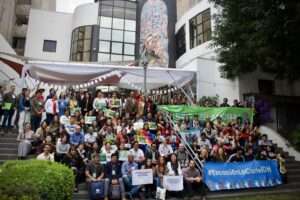
Ahead of the official Escazú COP3, Chilean CSOs Corporación Fiscalia Medio Ambiente (FIMA) and Congreso Estudiantil Universitario de Sustentabilidad (CEUS) organized a Pre-COP event to bring together civil society and Ethnic and Indigenous Peoples to build networks, gain a better understanding of diverse perspectives, and assess priorities for the Escazú COP itself.
The inaugural Pre-COP panel led by CIEL focused on the critical role of defenders in the climate emergency and the just energy transition, highlighting the unique vulnerabilities faced by women in these roles and advocating for gender-sensitive public policies to address the impacts of the crisis.
Regional partners from Perú (Derecho, Ambiente y Recursos Naturales (DAR)), Argentina (Fundación Ambiente y Recursos Naturales (FARN)), México (Comunicación y Educación Ambiental (CEA)), and Ecuador (Centro Internacional de Investigaciones sobre Ambiente y Territorio — Universidad Hemisferios (CHAT)) supported and participated in the panel. Speakers discussed key arguments from the joint written submission to the Inter-American Court focused on environmental defenders’ rights, which CIEL contributed to.
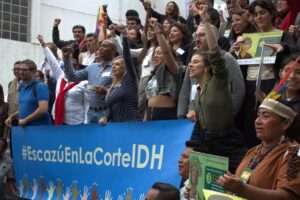
After a powerful week of advocacy, CIEL and partners launched a declaration emphasizing the historic
opportunity before the Inter-American Court. So far, hundreds of organizations and individuals have come together to urge the Court to adopt the standards of the Escazú Agreement to guarantee access rights and facilitate the work of human rights defenders in the context of the climate emergency. We will deliver this declaration to the Court at the second round of AO hearings, which will take place in Brasilia and Manaus, Brazil, at the end of May.
[Sign Now]
Reflecting and Looking Ahead
In addition to establishing the first Action Plan on Defenders, there were several significant decisions at COP3:
- Dominica officially became the 16th State Party to the Escazú Agreement.
- State Parties approved a draft decision welcoming all measures, initiatives, and activities aimed at integrating and strengthening the gender perspective in matters related to the Escazú Agreement.
- State Parties approved the document that establishes the working modalities of the Committee to Support Implementation and Compliance, which is tasked with promoting the implementation of the agreement and providing support to the Parties.
However, challenges remain, as Colombia, Perú, and Brazil have yet to ratify the agreement despite their positions at the top of the list of the most dangerous countries in the world for environmental and human rights defenders.
In the months ahead, CIEL and partners will be working to implement and integrate the Escazú Agreement throughout the region. We’re closely following the case at the Colombian Constitutional Court considering ratification of the agreement; working with partners to support States in their work on the Action Plan on defenders; and intervening at the next round of hearings for the Inter-American Court’s Advisory Opinion in Brazil on May 27.


